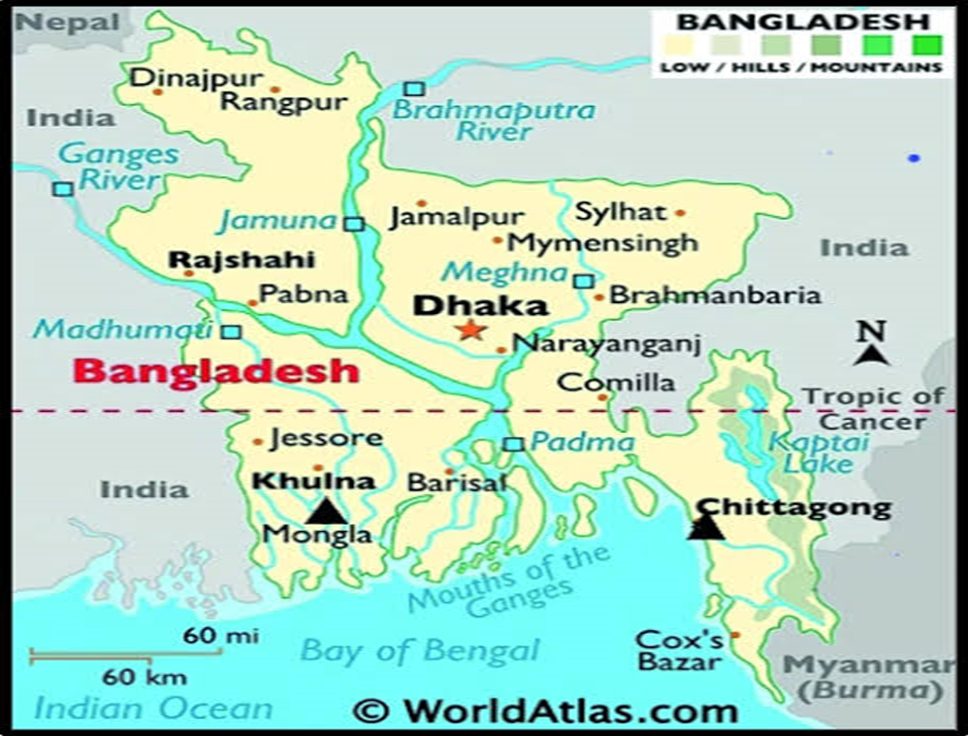DEMOCRACY DEFICIT
Syllabus:
GS 2:
- India and its Neighborhood- Relations.
- Effect of Policies and Politics of Developed and Developing Countries on India’s interests, Indian Diaspora.
Why in the News?
The growing discontent in Bangladesh highlights concerns over the erosion of democratic norms. Recent street protests, triggered by controversial government policies and perceived autocratic governance, have drawn attention to the country’s democracy deficit, prompting discussions on the need for stronger democratic institutions and processes to safeguard citizens’ rights.
Source: UGI
Historical Perspective on Independence and Democracy
- Independence Movements: On July 4, 1776, thirteen American states declared independence, marking the start of global revolutions. Many nations, including Australia and India, later gained independence, but independence doesn’t always ensure democracy.
- Post-Colonial Struggles: Countries like the US, France, and Australia have sustained democracy, but many post-colonial nations struggle with it. Only 20% of the world’s population currently lives under true democratic freedom.
- India’s Democratic Success: Since 1947, India has maintained a stable democracy. Despite challenges, Indians still enjoy the right to elect their government freely, a privilege not shared by many post-colonial nations.
- Global Democracy Deficit: Democracy is not guaranteed for every nation. Some countries have thrived, while others have fallen into autocratic rule or faced military coups, highlighting democracy’s fragility.
- Sustaining Democracy: India’s ongoing success shows that democracy requires constant effort. Independence alone doesn’t ensure freedom; maintaining democracy is a continuous process.
Economic Progress vs. Democratic Accountability
- Economic Growth’s Limits: Bangladesh’s economic success under Sheikh Hasina hasn’t shielded her government from criticism over democratic backsliding.
- Illusion of Stability: Autocratic leaders often believe economic growth compensates for democratic deficits, but in Bangladesh, dissatisfaction over issues like unemployment persists.
- Protests as a Symptom: The rise in protests indicates that economic progress can’t replace the need for democratic accountability.
- Risks of Protests: While protests can drive change, they also carry risks, including violence and threats to minorities, as seen in Bangladesh.
- Need for Reforms: To address the democratic deficit, Bangladesh needs reforms that strengthen institutions and protect citizens’ freedoms alongside economic progress.
Challenges to Democracy in Neighbouring Countries
- Pakistan’s Instability: Pakistan, independent since 1947, has faced multiple military dictatorships, marking a history of political instability.
- Bangladesh’s Struggles: Bangladesh, independent since 1971, faced military rule until 1991. Though now civilian-led, its democracy is still under strain.
- Sheikh Hasina’s Tenure: Under Sheikh Hasina, Bangladesh has seen economic progress but also criticism for undermining democratic processes, particularly in recent elections.
- Democratic Erosion: Despite progress, Bangladesh has seen a decline in democratic norms, leading to growing dissatisfaction, especially among youth.
- Consequences: Bangladesh’s democratic deficit has sparked protests over issues like corruption and inequality, highlighting the dangers of weakening democratic principles.
Importance of Addressing the Democracy Deficit
- Global Examples: Protests can lead to political change, as seen in Sri Lanka, but often face setbacks, like in the Arab Spring, where autocrats returned to power.
- Mass Protests: Protests arise when citizens lose faith in elections. If not addressed, these can lead to significant political upheaval.
- Potential Dangers: Protests can bring about change but also pose risks, particularly from extremist groups, threatening vulnerable communities.
- Closing the Deficit: Countries must close the democracy deficit by enforcing accountability, ensuring fair elections, and protecting rights.
- Lessons for Nations: Many countries face similar challenges. Strengthening institutions, promoting transparency, and encouraging citizen participation are key to preventing democratic erosion.
Way Forward/ Path to Strengthening Democracy
- Examples from the West: The US and UK have mechanisms to address democratic deficits, with leaders stepping down when faced with dissatisfaction, maintaining stability.
- Accountability: Political accountability through term limits, free media, and an independent judiciary is crucial for preserving democracy.
- Judiciary and Media: A fearless judiciary and free press are essential for holding governments accountable and preventing autocratic tendencies.
- Free Elections: Regular, transparent, and fair elections, conducted by an independent election commission, are vital for maintaining public trust in democracy.
- Parliamentary Dynamics: A vibrant parliament, with open debate between the ruling party and opposition, is key to addressing the democracy deficit and preventing autocracy.
- Civic Engagement: Encouraging active citizen participation in political processes strengthens democracy by ensuring diverse voices are heard and represented.
- Education on Democratic Values: Promoting civic education helps citizens understand their rights and responsibilities, fostering a culture of democratic participation and vigilance.
- Decentralization of Power: Decentralizing authority to local governments can empower communities and improve governance, making democracy more accessible and responsive to citizens’ needs.
- Transparency in Governance: Ensuring transparency in government operations and decision-making processes builds public trust and reduces corruption, vital for a healthy democracy.
Conclusion
Addressing the democracy deficit is crucial for the stability and progress of nations. Strengthening democratic institutions, ensuring free and fair elections, and promoting transparency and accountability in governance are essential steps. By fostering a robust democratic framework, countries can mitigate civil unrest and ensure long-term socio-economic development.
Source:The Hindu
Mains Practice Question
Discuss the significance of addressing the democracy deficit in ensuring sustainable governance. Illustrate with examples how democratic institutions can be strengthened to prevent civil unrest and promote stability.
Associated:




